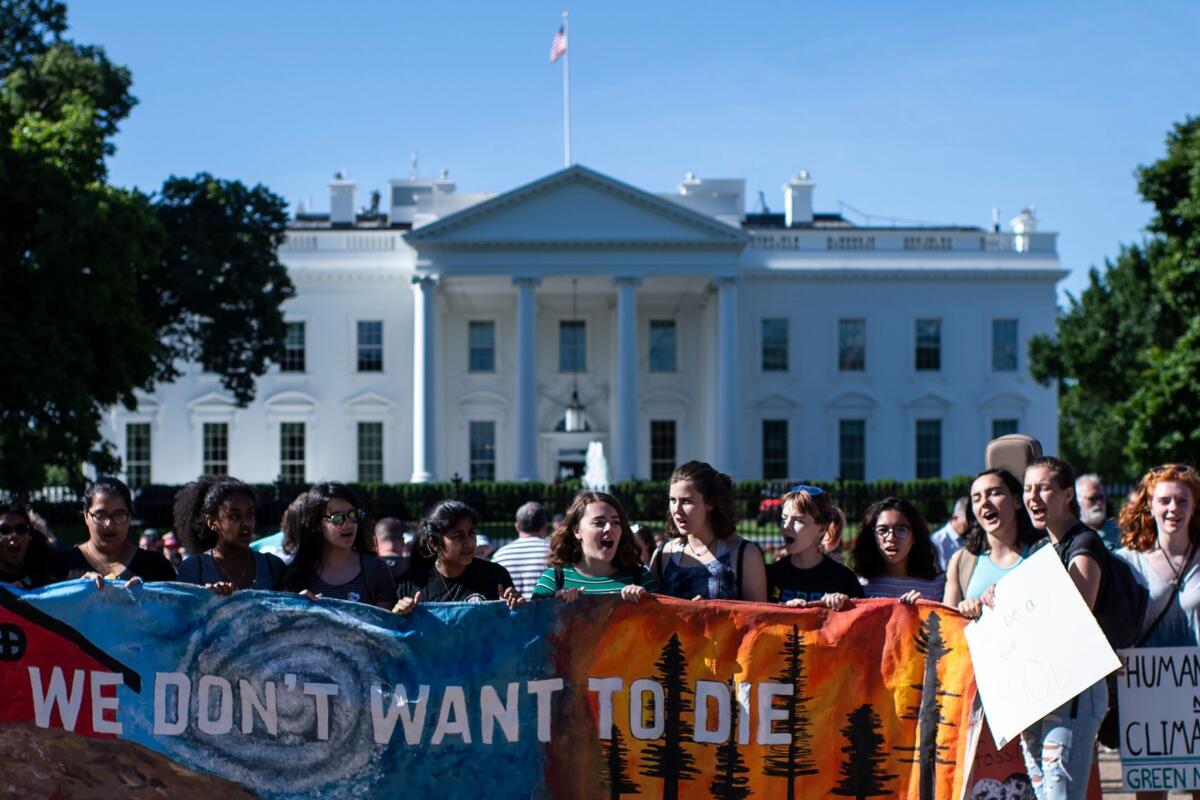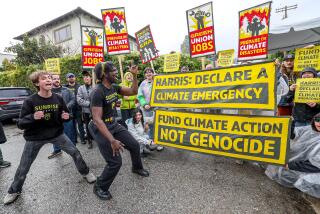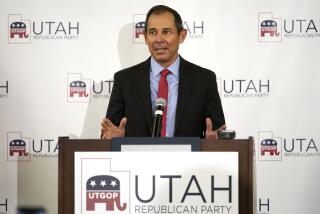Opinion: Why the youth climate strike has to take on racial justice

Young people and their supporters across the country are staging multiple protests on Friday under the banner of the U.S. Youth Climate Strike. For groups like the Sunrise Movement, one of the climate strike’s instigators, the demand for action on climate change can’t be severed from the broad social justice framework of a Green New Deal.
But why burden the fight to save our planet with these additional struggles to address economic and racial inequality — political fights that have proven intractable for decades, if not centuries?
Many worry that linking the environment, capitalism, and racism may thrill the progressive fringe but virtually guarantees that nothing will happen on climate policies. Why fuse these fights?
President Trump’s decision on Wednesday to revoke California’s independent authority to limit climate-warming auto emissions shows why these issues are inextricably linked — and therefore, have to be taken on together.
Consider the strategies of the petrochemical magnates Charles and David Koch.
Beginning in the early 1990s, if not before, the Kochs spent barrels of cash protecting their conglomerate’s bottom line against efforts to protect the environment. Initially, they focused on sowing doubt about climate science, and combined that with promoting and supporting pliant politicians. As Kert Davies, the director of the Climate Investigation Center, recently explained, “you’d have a carbon tax, or something better, today, if not for the Kochs. They stopped anything from happening back when there was still time.”
Then came President Obama’s election. The new administration promised strong action on the environment. The Kochs adjusted. They would, as the investigative journalist Jane Mayer points out, work to “hijack the tea party movement and, eventually, the Republican Party itself.”
The tea party exploded on the scene in the first years of the Obama administration. Some of the early energy that fueled that movement came from genuine economic grievances in the midst of a severe recession. Very quickly, however, racial resentment, anti-Muslim sentiment, and opposition to Obama himself transformed the movement.
If racial resentment howled through the tea party, the money that grew it into a political behemoth came from donors like the Koch brothers. According to a Republican campaign consultant, the Kochs funded it “like they put the seeds in the ground. Then the rainstorm comes, and the frogs come out of the mud — and they’re our candidates!” Or as David Axelrod, a senior advisor to Obama, acidly remarked, “This is a grass-roots citizens’ movement brought to you by a bunch of oil billionaires.”
The Kochs’ goal was to protect their petrochemical empire and to stop climate legislation. A central tactic was to support and elect politicians beholden to their agenda, which also meant funding purveyors of racial division.
Which brings us to Donald Trump. As Mayer writes: “Whether announcing his intention to withdraw from the Paris climate accord, placing shills from the oil and coal industries at the head of federal energy and environmental departments, or slashing taxes on corporations and the ultra-wealthy, Trump has delivered for the Kochs.”
This history of billionaires using racial division for their own purposes should be plenty familiar by now. It’s the basic story of Donald Trump. But as the Koch brothers illustrate, it’s not just Trump. The oligarchs winning power through racial demagoguery include some of the titans of our times.
Responding to the climate crisis requires collective action on a massive scale, and the most potent political impediment to collective action comes from racial division, often intentionally stoked by right-wing plutocrats. That’s why mobilizing Americans on climate-change policy also requires countering racial division and seeking economic benefits that are broadly shared.
When the young people striking for climate action demand action on racism and unrestrained capitalism, it’s because they understand that all of these issues are inseparable. Unless we tackle them together, they will defeat us over and over, until it’s all over.
Ian Haney López is a law professor at UC Berkeley and the author of the forthcoming “Merge Left: Fusing Race and Class, Winning Elections, and Saving America.”
More to Read
A cure for the common opinion
Get thought-provoking perspectives with our weekly newsletter.
You may occasionally receive promotional content from the Los Angeles Times.






